18 Ways Family Vacations Looked Like Before GPS And Yelp Reviews
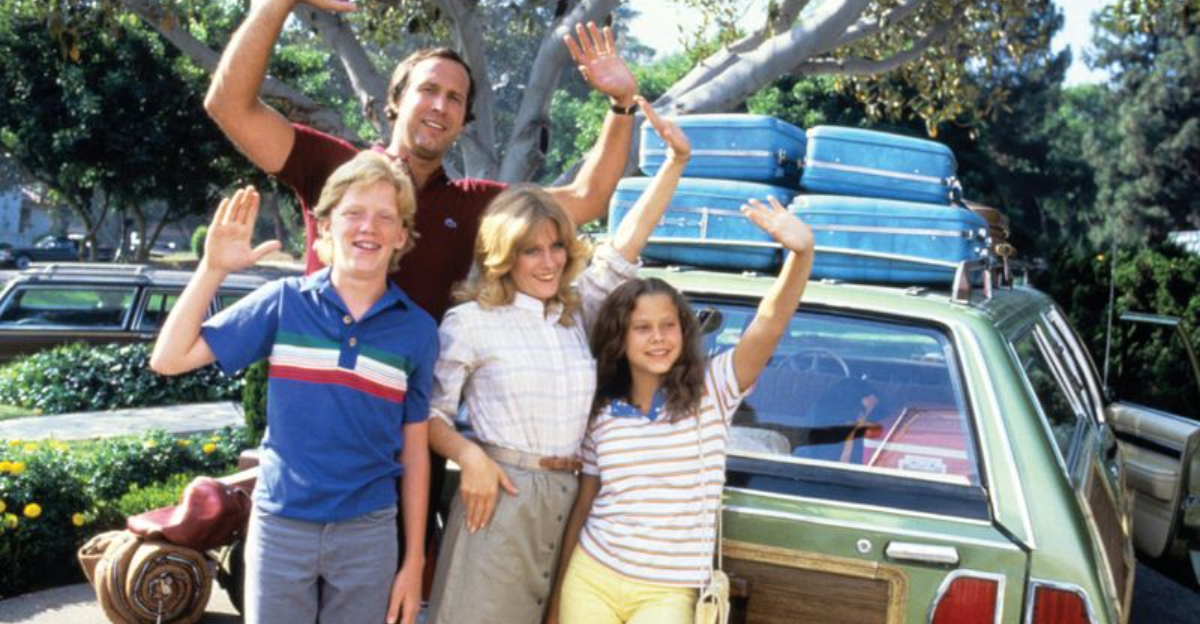
Oh, how could I forget those gloriously chaotic family road trips from the ’80s and ’90s? Back then, vacations weren’t about curated Instagram moments—they were about cramming the whole family (and half the house) into the car and hoping for the best.
The journey started with a stack of cassette tapes, a cooler full of questionable sandwiches, and a massive paper map that unfolded like a magic scroll.
My parents would argue about exits while we in the backseat debated the merits of window versus middle seat warfare. For dining options? Forget Yelp—our gourmet guides were gas station attendants and hand-painted signs promising “World’s Best Pie.”
Wrong turns were part of the adventure, and when Dad finally gave in and asked for directions, it was a moment of epic drama. Sure, GPS makes things easier now, but those unpredictable, laughter-filled road trips had a kind of charm you just can’t download.
1. Paper Map Marathons
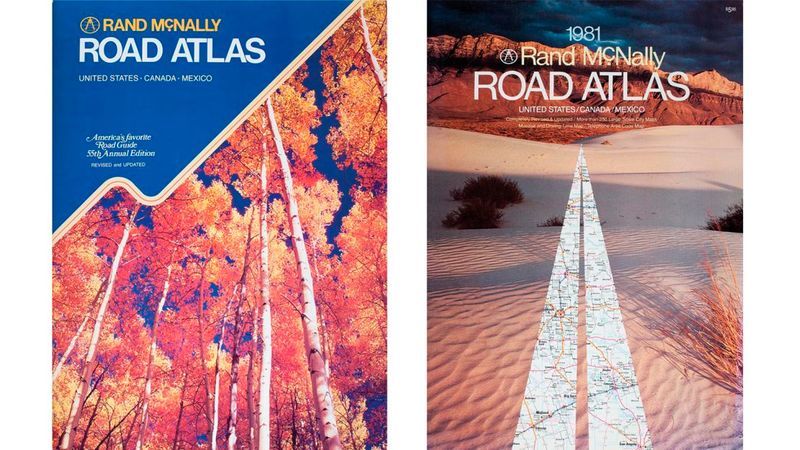
My dad’s proudest possession wasn’t his watch or wallet—it was his meticulously folded Rand McNally Road Atlas. This tattered bible of highways lived in our glove compartment, emerging whenever we approached an unfamiliar junction. Mom would squint at impossibly small town names while simultaneously holding the flashlight during night drives.
The real entertainment began when we inevitably missed an exit. Dad would mutter creative non-swears while Mom performed origami with the unwieldy map, trying to find alternate routes. My sister and I learned geography by necessity, becoming experts at finding those thin blue lines that might save us 20 minutes.
The best part? Those accidental detours often led to the most memorable discoveries—quirky roadside attractions, breathtaking viewpoints, or tiny diners serving unexpectedly delicious pie. Sometimes getting lost was the whole point of the journey.
2. Motel Roulette
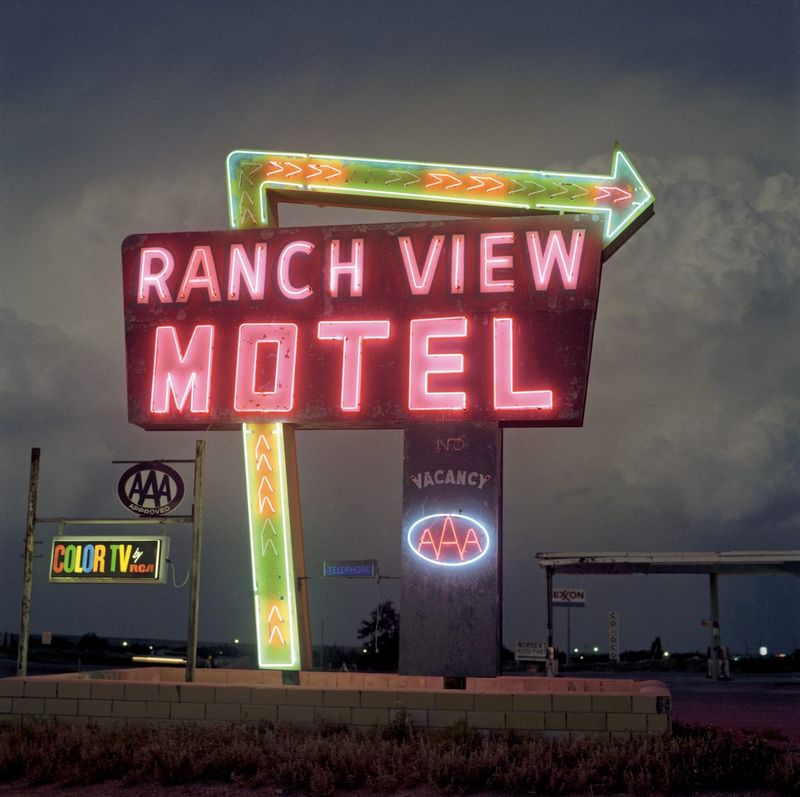
Booking hotels in advance? That wasn’t part of our vacation vocabulary! Instead, we played what I lovingly call ‘Motel Roulette’—driving until dusk and then scanning the horizon for neon ‘Vacancy’ signs. Dad would pull into promising-looking places while Mom ran inside to inspect the rooms.
Some nights we struck gold with clean sheets and a pool. Other times we faced mystery stains and suspicious odors that sent us scrambling back to the car. The real suspense came during peak travel seasons or in small towns with limited options—I’ll never forget sleeping in our station wagon at a rest stop because every room within 50 miles was booked.
Yet something about this unpredictability made each night an adventure. Would we get the room with the magical Magic Fingers vibrating bed? Would the ice machine work? The uncertainty was half the fun!
3. The Trusted Guidebook
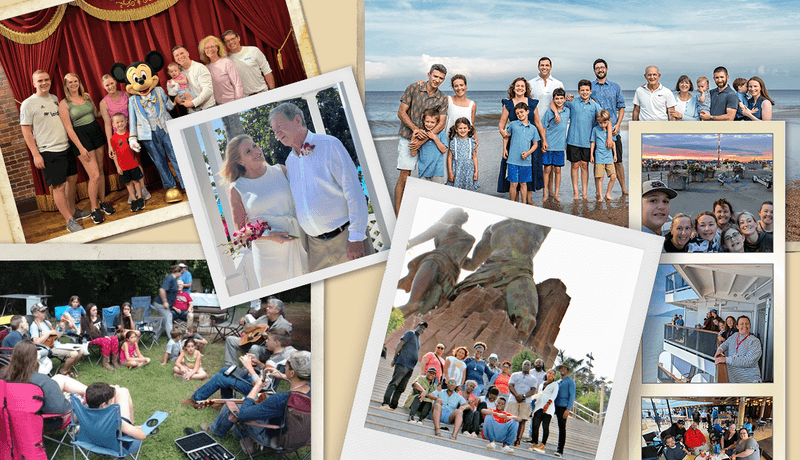
Long before Yelp stars determined dining destinies, my mother clutched her dog-eared copy of ‘The Mobil Travel Guide’ like it contained the secrets of the universe. This sacred text, updated annually with a fresh purchase before our summer excursion, featured tiny print reviews of hotels and restaurants deemed worthy by mysterious professional reviewers.
Mom would study it religiously each evening, circling potential stops with her red pen. The little fork symbols indicated price ranges, while star ratings promised quality. We learned to trust the guide’s recommendations, though occasionally we’d arrive at a ‘three-star gem’ only to find it had closed six months earlier.
The real treasure was the handwritten notes Mom added in the margins from previous trips: ‘Ask for corner booth!’ or ‘Avoid clam chowder!’ These personal annotations transformed the mass-produced guidebook into our family’s customized travel companion.
4. The Backseat Entertainment System
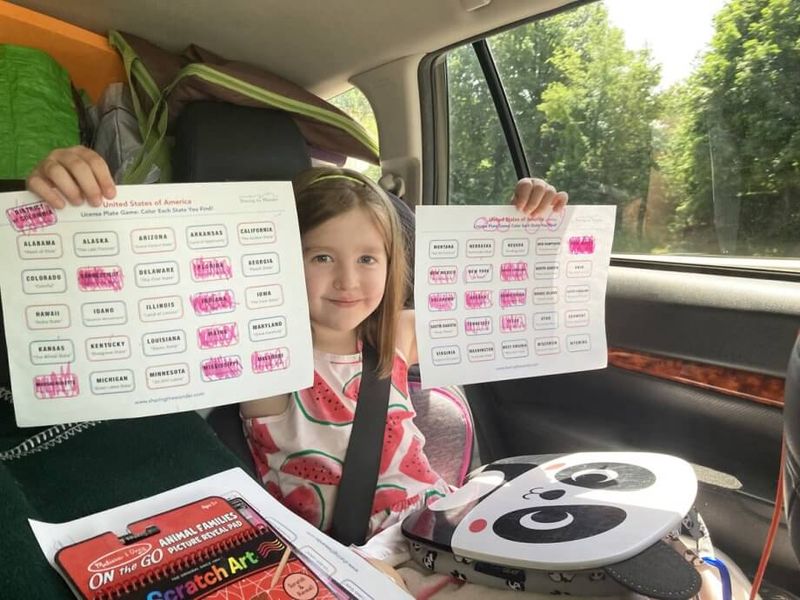
Forget iPads and DVD players—our backseat entertainment consisted of whatever we could fit in our laps! I became a master of balancing a stack of Mad Magazines, comic books, and those little travel-sized board games with magnetic pieces that inevitably got lost under the seats.
The pinnacle of road trip technology was my sister’s battery-powered handheld football game that beeped incessantly until Dad threatened to throw it out the window. We’d take turns with our prized Game Boys until the batteries died somewhere in Kentucky, leaving us to resort to primitive games like ‘I Spy’ and ‘Count the Cows.’
The real MVP was my mother, who packed surprise paper bags labeled with highway mile markers. Upon reaching each designated point, we’d tear into them to discover new coloring books, crazy straws, or weird gas station snacks she’d secretly stashed before departure.
5. Roadside Attraction Roulette
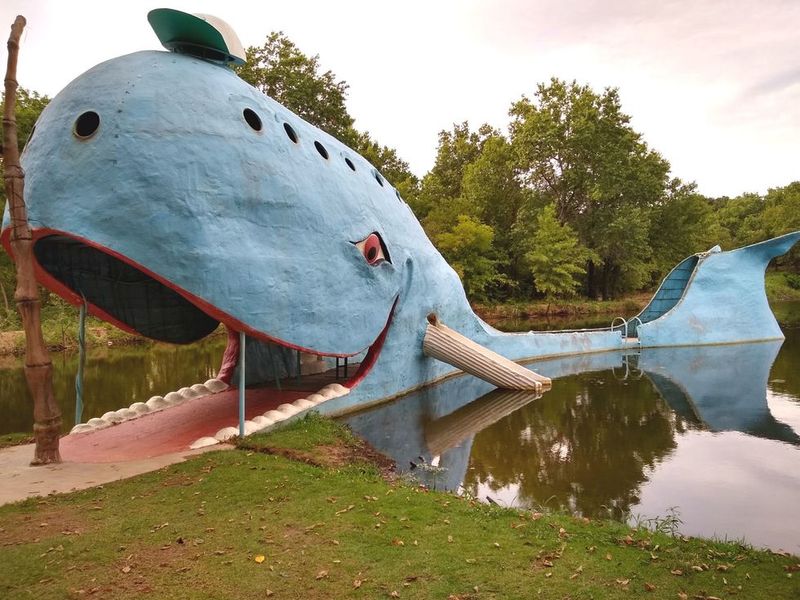
Billboards were our Instagram feed, tempting us with oddities that lay ahead. ‘WORLD’S LARGEST BALL OF TWINE – NEXT EXIT!’ would send us into a frenzy of begging until Dad relented. These tourist traps were gloriously hit-or-miss—sometimes awe-inspiring, often hilariously disappointing.
My family developed a sophisticated rating system for these attractions. Five stars meant genuinely impressive (Mammoth Cave), while one star indicated ‘complete waste of $2 admission’ (sorry, Museum of Souvenir Spoons). The real gems were the free oddities: massive fiberglass animals, bizarre statues, or abandoned theme parks that we’d explore with equal parts caution and delight.
We collected tacky souvenirs from each stop—pressed pennies, snowglobes, and those name-embossed mini license plates that never had my unusual name. These plastic treasures became cherished mementos, telling the story of our journey better than any carefully filtered photo could.
6. The Great Restaurant Gamble
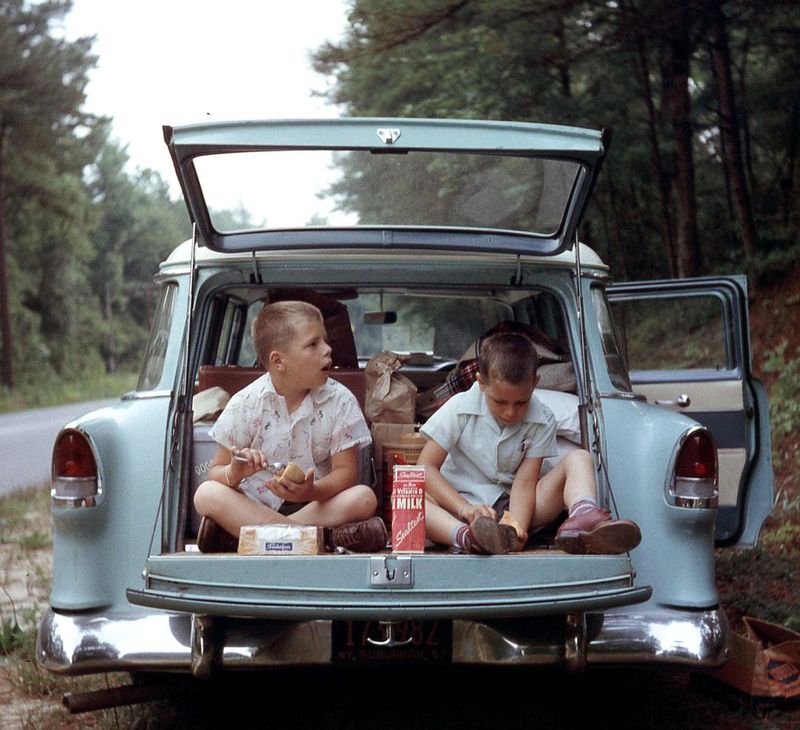
Mealtime was always a thrilling gamble on the open road! Without Yelp reviews to guide us, we relied on primitive methods of restaurant selection—like counting cars in parking lots or judging establishments by their hand-painted signs. ‘If the locals eat there, it must be good!’ was Dad’s mantra, though this philosophy occasionally led us to questionable diners with suspiciously cheap blue plate specials.
My mother developed her own system: inspect the bathrooms first. ‘Clean restrooms mean clean kitchens,’ she’d declare, sometimes marching us right back out after her reconnaissance mission. The truck stop criteria was different—the more eighteen-wheelers outside, the better the food inside.
Sometimes we’d strike culinary gold, discovering home-cooked meatloaf that would become family legend. Other times we’d encounter dishes so mysterious we’d stop at the next gas station for emergency cheese crackers and soda to wash away the memory.
7. The Unplanned Swimming Experience
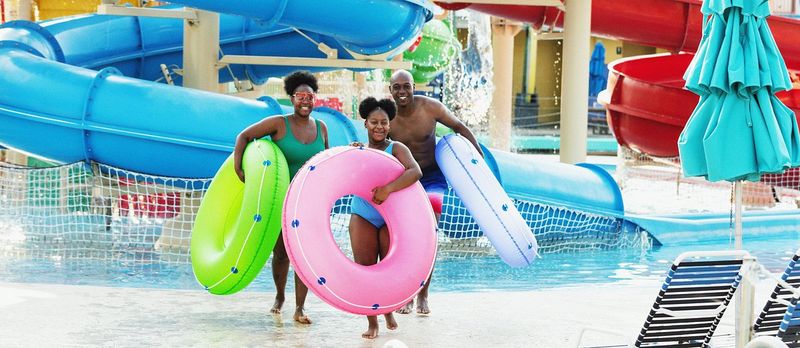
Nothing elevated a motel from ‘adequate’ to ‘paradise’ faster than a swimming pool, no matter how small or questionably maintained. We’d scope out these aquatic treasures from the car window—my sister and I pressing our noses against the glass, calculating chlorine levels by sight alone.
The pool experience was a masterclass in lowered expectations. Frigid water? No problem! Mysterious floating objects? Just dodge them! The real luxury was finding a motel with both a pool AND a vending machine that dispensed those little cups of Dippin’ Dots.
Dad would perform his ritual safety inspection, testing the water depth with one cautious toe while Mom spread towels across plastic loungers. Meanwhile, my sister and I would cannon-ball into the shallow end, creating waves that annoyed other guests. Those impromptu evening swims—with highway sounds as our soundtrack and the neon motel sign casting pink light across the water—remain some of my most vivid childhood memories.
8. The Trunk-Packed Cooler
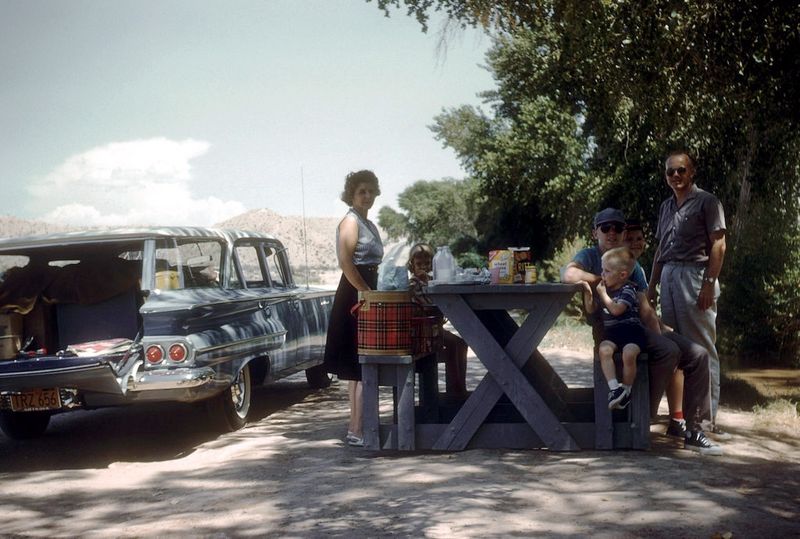
Our family cooler—a massive blue Coleman that required two adults to lift when full—was Dad’s pride and joy. The night before departure, he’d perform the sacred ritual of ice pack arrangement, creating a Tetris-like configuration that would keep perishables cold for days.
Mom’s sandwich assembly line produced enough individually wrapped PB&Js to survive nuclear winter. These squished treasures would emerge at scenic overlooks and rest areas, slightly soggy but infinitely more affordable than restaurant fare. The cooler hierarchy was strict: sodas on top for easy access, cheese in the middle zone, and mysterious foil-wrapped leftovers in the bottom arctic region.
By day three, the cooler became a science experiment of melted ice and floating lunch meat. Yet somehow, those warm sandwiches eaten on picnic tables alongside interstate highways tasted better than any five-star restaurant meal. Maybe it was the adventure seasoning everything with excitement—or just the miracle of Mom’s homemade cookies surviving the journey intact.
9. Car Games of Desperation
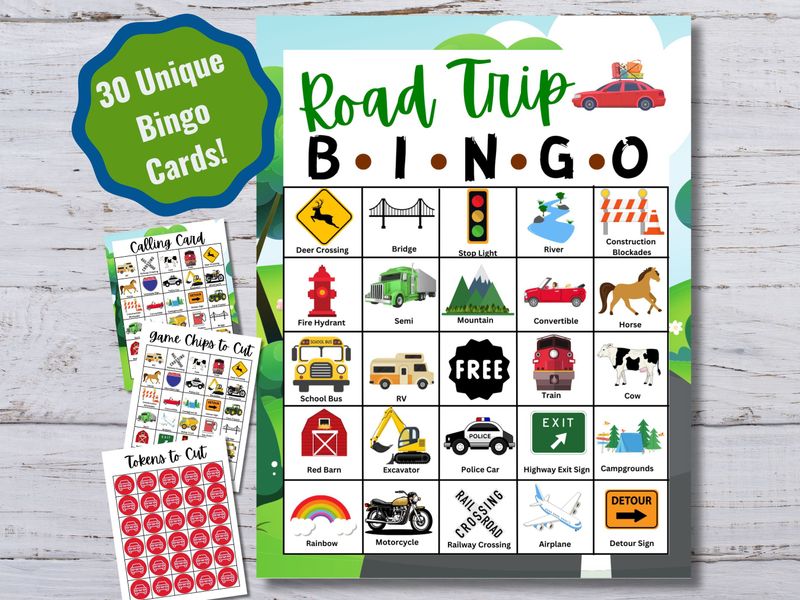
Four hours into an eight-hour drive, with the novelty of travel worn thin, my family would resort to increasingly desperate entertainment measures. The progression was predictable: first came the sophisticated games like 20 Questions, then the alphabet-based challenges (‘I’m going on a picnic and bringing an apple…’), finally devolving into who-can-spot-the-most-cows competitions.
My father, normally a sensible accountant, would transform into a game show host, inventing increasingly bizarre contests. ‘First person to see a red car with out-of-state plates gets to choose the radio station for fifteen minutes!’ The stakes were enormous in our young minds.
License plate bingo cards disintegrated from overuse as we frantically searched for elusive Vermont and Alaska plates. The pinnacle of achievement was spotting a Volkswagen Beetle, which granted punching rights—’Punch Buggy Yellow, no punch backs!’—a game that inevitably ended in tears and Dad’s solemn vow that ‘I will turn this car around if you kids don’t settle down!’
10. The Emergency Bathroom Protocol
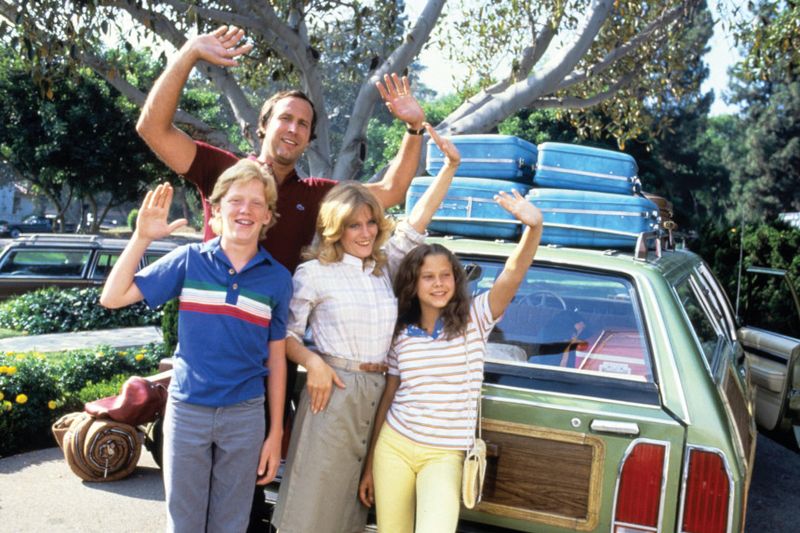
‘I told you to go at the last gas station!’ These words echoed through my childhood road trips, usually about 15 minutes after we’d passed the last restroom for 50 miles. Our family developed an elaborate emergency bathroom protocol that would impress military strategists.
Dad became an expert at spotting potential pit stops—fast food restaurants where you could sneak in without purchasing anything, department stores with restrooms near the entrance, and public parks with questionable but functional facilities. Mom always carried a roll of toilet paper in her purse, prepared for worst-case scenarios involving roadside emergencies behind the largest available bush.
My sister and I learned to hold it for superhuman durations, developing bladders of steel through necessity. The ultimate victory was finding a clean rest stop with working paper towel dispensers—a luxury that warranted actual celebration from the entire family. Nothing builds character quite like a desperate highway bathroom search in pre-smartphone America!
11. The Backseat Border Wars
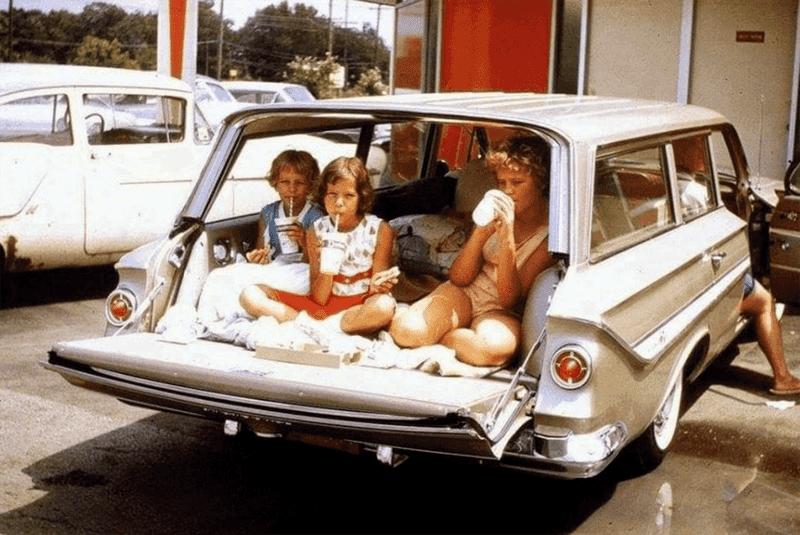
The Mason-Dixon line had nothing on the invisible boundary dividing the backseat of our Chevy station wagon. My sister and I negotiated territorial treaties with the seriousness of international diplomats. ‘You crossed the line!’ ‘Did not!’ ‘Mom, she’s on my side!’
Dad’s solution was architectural—constructing a barrier of pillows and luggage down the middle. This Berlin Wall of the backseat rarely lasted beyond the first pit stop. The real nuclear option was Mom reaching back without looking to deliver her famous ‘blind swat’—a maneuver with remarkable accuracy despite her eyes remaining fixed on the road ahead.
The worst punishment was being relocated to the dreaded ‘way back’—that rear-facing third seat where you’d wave at truckers and get carsick from watching the world recede. Yet somehow, those cramped quarters forged unbreakable bonds. By trip’s end, we’d be huddled together on one side of the car, sharing comic books and whispering secrets, having forgotten what we were fighting about in the first place.
12. The Radio Station Hunt
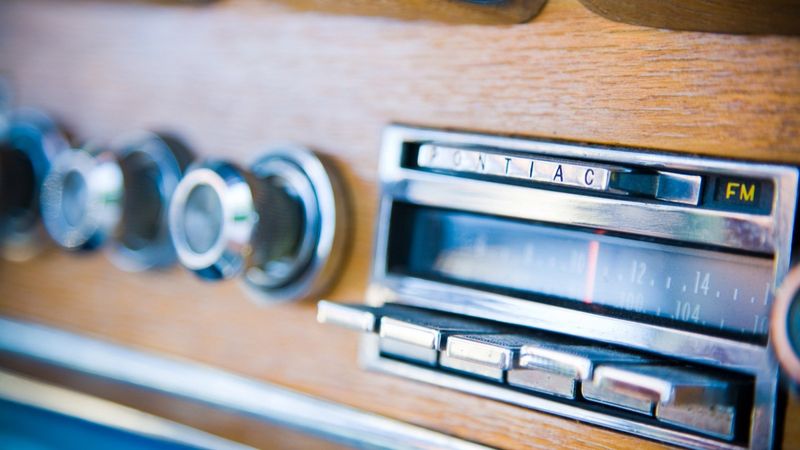
As we crossed invisible broadcast boundaries, our favorite radio stations would gradually dissolve into static, launching Dad into his famous ‘radio hunt’ ritual. With one hand on the wheel and the other frantically spinning the dial, he’d sample snippets of farm reports, fire-and-brimstone preachers, and country music ballads until finding something marginally acceptable.
Those pre-playlist days meant embracing musical diversity by necessity. One hour might bring Casey Kasem’s American Top 40, the next an all-polka station that was somehow the only clear signal in western Pennsylvania. We’d judge each town by its radio offerings—places with good music got a mental gold star for future visits.
The real excitement came when we’d catch the first notes of a family favorite. ‘Turn it up!’ we’d shout in unison, followed by horrifically off-key family sing-alongs to Journey or REO Speedwagon. Mom’s enthusiastic harmony attempts, Dad’s made-up lyrics when he forgot the real ones—these impromptu concerts remain my soundtrack to childhood adventure.
13. The Camera Film Rationing
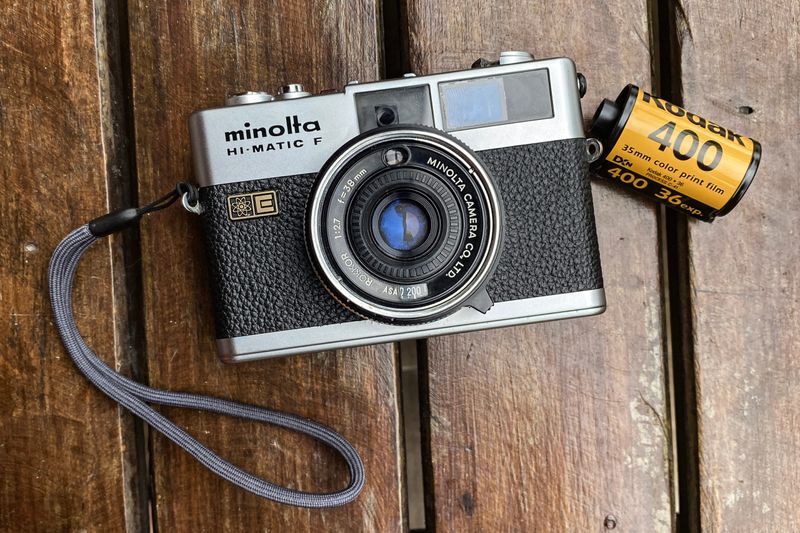
Long before smartphones enabled endless photo-taking, our vacation documentation relied on Dad’s precious 24-exposure film rolls. ‘Don’t waste a shot!’ he’d warn as we begged to capture random roadside cows. Each potential photo faced rigorous evaluation—was this scenic overlook truly worthy of 1/24th of our visual vacation record?
The suspense lasted weeks beyond the trip itself. We’d drop off film at the drugstore photo counter, then anxiously return days later to discover which memories had survived. Half-closed eyes, accidental thumb coverage, and mysterious light leaks were part of the charm. The greatest disappointments came from those perfect sunset shots that turned out to be nothing but an orange blur.
Yet those physical photo albums, with their imperfections and limited scope, somehow captured the essence of our journeys better than today’s exhaustive digital collections. We treasured each image precisely because they were finite—curated moments that had earned their place in family history through the sacred ritual of film rationing.
14. The Gas Station Mythology
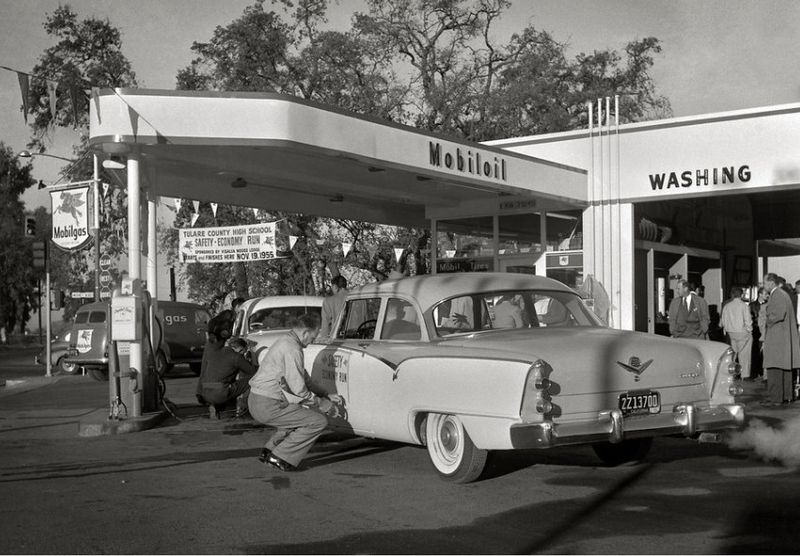
Gas stations weren’t just refueling points—they were information exchanges, cultural outposts, and temples of local knowledge. Dad would strike up conversations with attendants who pumped our gas (yes, someone else actually pumped your gas!), extracting priceless intelligence about road conditions and shortcuts that no app could provide.
These interactions followed a ritual: casual weather observations, followed by car compliments, culminating in the crucial question—’What’s the best way to get to…?’ The station’s collection of free paper maps became our treasures, each one marked with handwritten notes from friendly locals about speed traps to avoid or diners worth visiting.
My favorite stations featured quirky attractions—giant fiberglass dinosaurs, exotic jerky varieties (ostrich, anyone?), or weird collections like the Oklahoma station displaying hundreds of rattlesnake rattles in glass jars. The restroom key attached to enormous wooden paddles ensured you’d never accidentally pocket it—these massive markers of bathroom access were practically highway heritage items themselves.
15. The Art of Car Packing
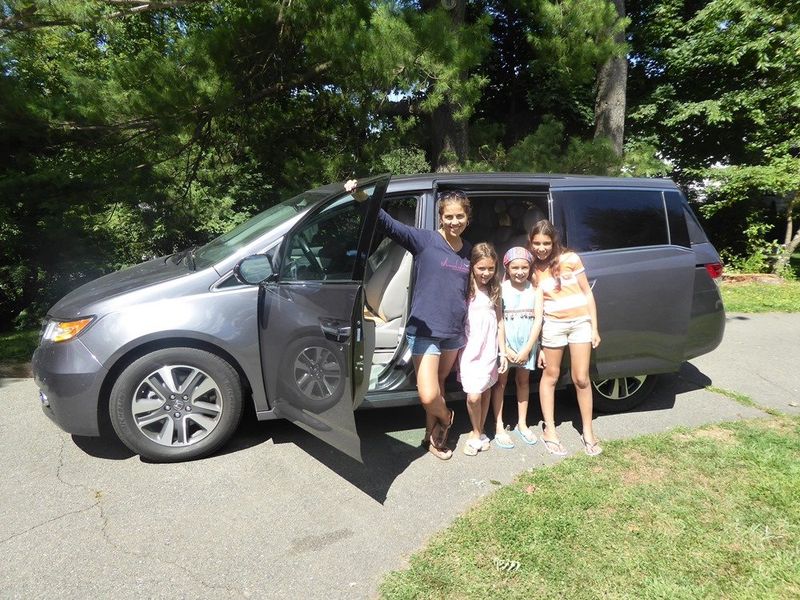
Dad approached packing the car with the precision of a NASA engineer preparing for launch. The night before departure, he’d stand in the garage, staring at our luggage with narrowed eyes, mentally calculating cubic inches like some automotive Tetris master. ‘We can make it all fit,’ he’d mutter, more to himself than to us.
The loading sequence was strictly choreographed—hard suitcases formed the foundation, followed by softer duffels and sleeping bags. Shoes were stuffed with socks and small items to maximize space efficiency. The sacred cooler got prime positioning for mid-journey access, while emergency supplies (jumper cables, tools, flashlights) lined the perimeter.
By journey’s end, this perfect system devolved into chaos. Souvenir bags, discarded maps, and fast food wrappers filled every crevice. The final test came when we’d acquire some oversized roadside purchase—like the four-foot wooden giraffe from South of the Border—requiring a complete reconfiguration at a rest stop while Mom rolled her eyes at Dad’s ‘essential’ souvenir.
16. The Hotel Pool Promise
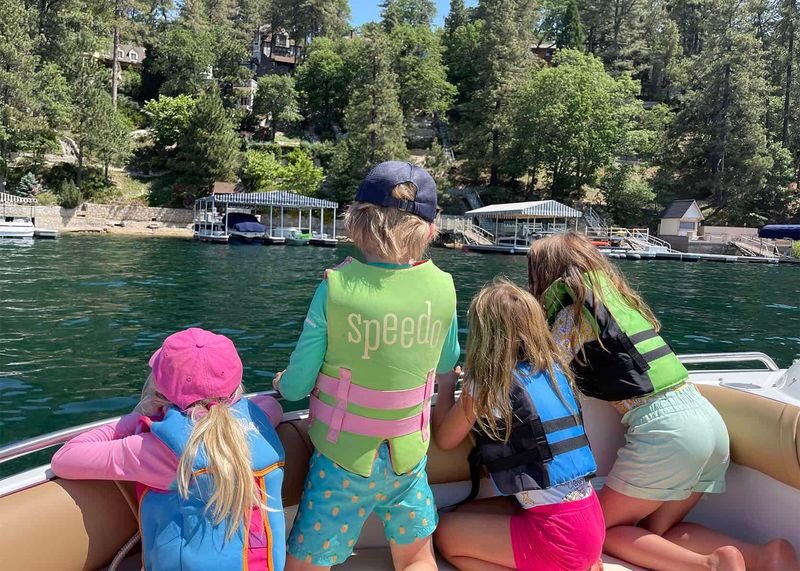
‘Yes, the next hotel definitely has a pool!’ This parental promise fueled hours of backseat patience, though its reliability varied wildly. We’d arrive at motels where ‘pool’ meant anything from an Olympic-sized oasis to a glorified puddle with suspicious floating debris—or worse, the dreaded ‘closed for maintenance’ sign that crushed childhood dreams.
My sister and I developed a sophisticated evaluation system: diving boards earned bonus points, while visible algae resulted in immediate deductions. Hot tubs were the ultimate luxury, though Mom’s strict ‘ten-minute maximum’ rule limited our prune-finger potential. The true jackpot was finding a hotel with both a pool AND a game room, creating the perfect evening entertainment doubleheader.
Nothing bonded traveling families like those chlorine-scented concrete grottos. We’d make instant vacation friends, organizing impromptu splash contests with kids we’d never see again. Those fleeting poolside friendships—intense, joyful, and forgotten by morning—were somehow perfect metaphors for the transient magic of family travel itself.
17. The Souvenir Strategy Sessions
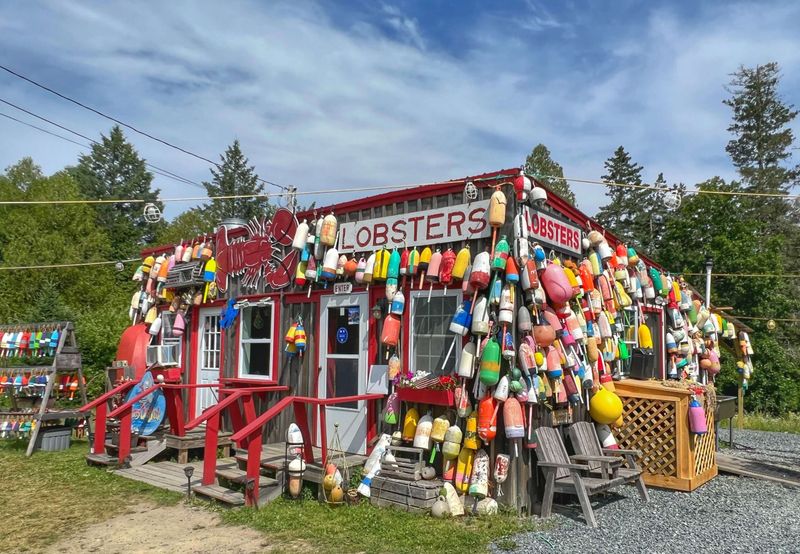
Vacation budgeting reached its peak intensity during the Great Souvenir Negotiations. Mom would distribute our allowance at trip’s start—a princely sum that seemed enormous until faced with gift shop temptations at every turn. ‘Spend wisely,’ she’d warn. ‘This needs to last the whole trip.’
I developed complex algorithms for maximizing souvenir value. T-shirts offered high visibility but consumed most of my budget in one shot. Postcards provided affordable mementos but lacked pizzazz. The perfect middle ground? Keychains—compact, relatively cheap, and featuring miniature representations of every landmark from Mount Rushmore to the World’s Largest Ball of Twine.
The real strategy involved patience—holding out for the perfect souvenir rather than blowing funds at the first gift shop. Nothing taught delayed gratification like clutching vacation dollars for days, weighing each purchase against unknown treasures that might lie ahead. Those carefully selected mementos—however tacky—became touchstones of memory, each one unlocking stories that grew taller with each retelling.
18. The Polaroid Moment
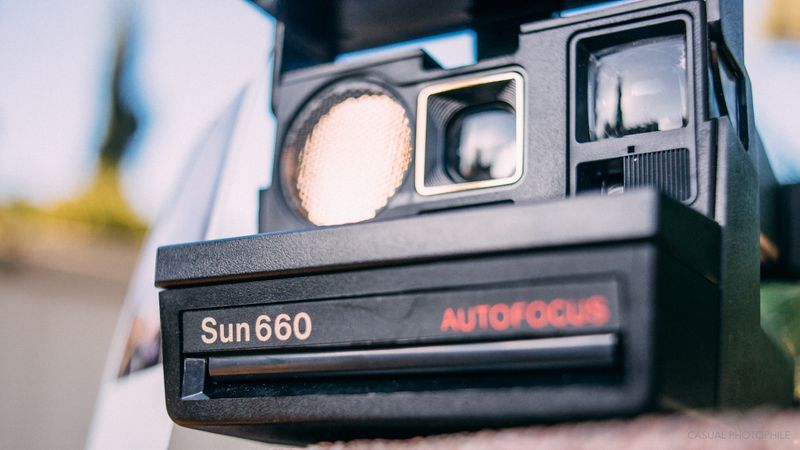
Before digital cameras offered instant gratification, we had Polaroids—magical squares that developed before our eyes, accompanied by that distinctive chemical smell. Mom was our designated Polaroid operator, carefully rationing film packs that cost a small fortune and required protection from heat (no easy feat in a car crossing Arizona in July).
The anticipation was exquisite—watching blank squares slowly reveal our smiling faces against monument backdrops. We’d gather around, waving the developing photo despite Mom’s insistence that this didn’t actually help. Each shot was precious, warranting careful composition and multiple ‘everyone say cheese’ attempts before Mom would press the button.
These instant photos became our travel diary, taped to the car windows or hotel mirrors, creating a growing gallery of adventures. By trip’s end, the dashboard displayed a chronological exhibition of our journey—sunburns intensifying, hairstyles wilting, and smiles widening with each new destination. Those chemical-scented snapshots captured both the destinations and our changing selves along the way.
